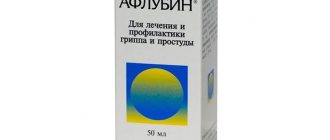Many mothers wonder: if you have a sore throat, what can you do to treat it while breastfeeding? This is indeed a serious topic of conversation. Any illness during breastfeeding causes a lot of trouble, because a nursing mother is prohibited from using most medications.
Therefore, women are looking for alternative treatments, for example, traditional or homeopathic. But first you need to understand the nature of the pain, understand its causes, and only then begin treatment.
Causes and symptoms
- Tonsillitis. This is the notorious sore throat, it is most often caused by various bacteria. During a sore throat, the tonsils become affected and become inflamed. This disease is quite dangerous, if it is not treated, complications such as rheumatism, heart failure, etc. may appear. The main symptoms of acute tonsillitis are pain when swallowing, enlargement and redness of the tonsils, increased temperature (up to 40 ° C), purulent formations on the tonsils, enlarged and painful lymph nodes are also possible.
An additional symptom caused by high fever is headache or general weakness. Chronic tonsillitis has slightly different symptoms. Such as pain and discomfort when swallowing, bad breath, dryness and sore throat, increased fatigue, occasional slight increase in temperature, pain in the cervical lymph nodes, loss of appetite.
- Laryngitis . This disease rarely develops on its own. As a rule, it is a consequence of acute respiratory viral diseases. This is the case when the disease cannot be classified as a sore throat, because it is a consequence, not the cause of the disease. The main symptoms of laryngitis are thickening of the vocal cords, inflammation of the blood vessels of the larynx, hoarseness of the voice, deterioration in the general condition of the body, increased body temperature, and the possible appearance of a dry cough.
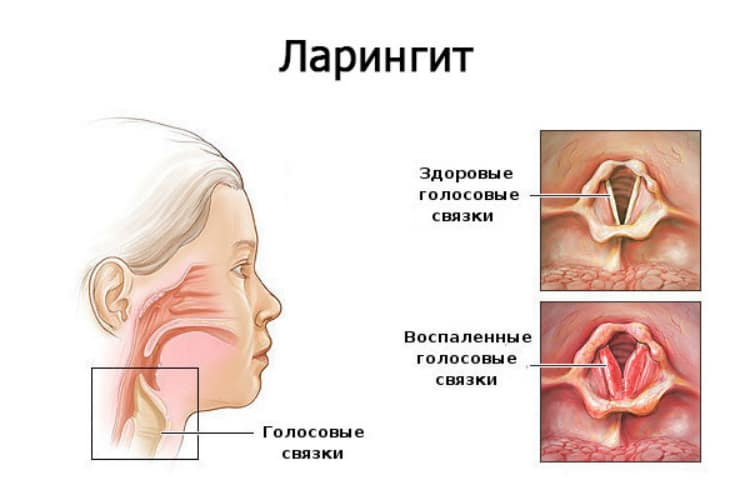
- Pharyngitis. This disease can be caused by both bacteria and viruses. The main symptoms of pharyngitis are dry throat, discomfort when swallowing, fever, swelling of the back of the throat, as well as headache and general weakness.
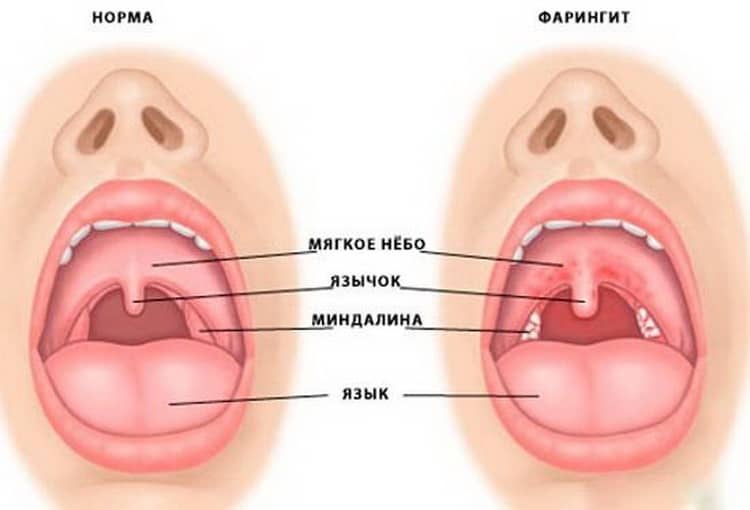
- Candidiasis. The cause of this disease is a fungus. It is found in the body of almost all people, but only in a passive form. A healthy human immune system usually keeps this fungus under control. But a failure in the immune system or HIV can allow this disease to manifest itself. In this case, a person feels pain when swallowing, red or white spots appear on his throat, as well as a headache and attacks of nausea.

Please advise how a nursing mother can treat a sore throat.
The following reasons may influence the development of unpleasant symptoms:
- Allergy. With an allergic reaction, there is no severe sore throat. There is a slight soreness. In addition, there is mucous discharge from the nose and redness of the eyes. The allergen may be dust or pollen.
- ORZ. In this disease, the mucous membrane of the throat is affected by viral agents. Symptoms of the disease: headache, rise in body temperature, weakness, nasal congestion.
- Pharyngitis. This disease is characterized by inflammation of the back wall of the throat, causing pain accompanied by a sore throat.
- Laryngitis. The inflammatory process affects the lower part of the throat, as a result of which it is difficult for air to reach the vocal cords, wheezing occurs in the throat, and the voice changes.
- Tonsillitis. In this case, the disease affects the tonsils, as a result of which they become covered with a white coating. It is difficult for a person to talk, eat, and even swallow saliva.
- Dry air in the room. This cause of sore throat occurs mainly during the winter heating period. Too dry air leads to drying out of the mucous membranes of the throat and nose, as a result of which the patient feels soreness and discomfort.
- Bacterial infection. In this case, we are talking about streptococci, which damage the tonsils and contribute to the formation of a whitish coating on them. As a result, a sore throat forms, the person feels general weakness, and his body temperature rises.
When a nursing mother’s throat starts to hurt, the first thought is a cold. But in fact, there are many diseases that cause pain in the larynx, and some of them are not so harmless as to experiment with treatment and solve the problem without the help of specialists.
If possible, it is better to seek help from a doctor. But if there is no one to leave the child with, then first of all you need to try to diagnose yourself. Common throat diseases include:
- Sore throat or tonsillitis. This is inflammation and redness of the tonsils, on which plaque of pus can form in the form of capsules and veins. This disease is often accompanied by fever.
- Most often, laryngitis is popularly called “throat disease.” As a rule, it develops after hypothermia and is rarely caused by viruses. Symptoms extend to the throat, vocal cords and epiglottis. May be accompanied by a cough if it descends onto the trachea.
- Characteristic features of pharyngitis are inflammation of the back walls of the throat. Often accompanied by a dry cough, runny nose and fever. The origin may be viral or infectious.
- Mucosal candidiasis is a disease of fungal origin. The main symptoms include itching, blistering, curdled discharge and erosion.
In case of a sore throat, it is better to treat the throat during lactation according to the recommendations of a doctor, who will most likely prescribe a course of antibiotics. As for whether it is possible to breastfeed while taking antibiotics, in this case it is also better to consult with a specialist - it all depends on the drug.
In a situation with fungal diseases, laboratory examinations are required, and laryngitis with pharyngitis can often be cured with local treatment. In any case, in addition to establishing the root cause, every nursing mother should know how to treat the throat with local remedies during lactation so as not to harm the child.
A woman may not know about this and think that the pain is due to a cold. However, when treatment does not help, it becomes clear that it is necessary to identify the causes of the sore throat. What to do{q}
- Visit a doctor and get a diagnosis. In addition to the examination, the specialist may prescribe an examination. This is an MRI or radiography. Based on the diagnosis, the doctor prescribes treatment. Sometimes these are medications that relieve pain and inflammation, or vitamins that are compatible with breastfeeding.
- Train your neck muscles. And you can successfully treat it at home. Several times a day, do exercises to strengthen the neck muscles: rest your forehead, left cheek, right cheek and back of your head on your palm. It is also important to give your neck and spine a chance to rest. Be sure to take a warm, relaxing bath every day.
If the doctor sends a nursing mother for an MRI or X-ray, she needs to pump and prepare several servings of milk for feeding the baby a day. And after the diagnostic procedure, also express several portions, but do not give them to the child.
The throat may hurt after strong mechanical stress and strain. This happens after an attack of coughing or vomiting. In this case, a warm softening drink will help - milk with a spoonful of honey (if mother and child do not have an allergic reaction to it), tea with mint.
For quick healing, a chamomile decoction is recommended. You can also apply one or two drops of anise oil to a sugar cube and dissolve.
If you approach the problem wisely, even medicinal treatment of the throat during breastfeeding will be safe for the child. Therefore, feeding can and should be continued.
Remember that milk protects the baby from mother's illness. And when the temperature rises, it will not “burn out” or “deteriorate.” Sometimes the taste changes, but this phenomenon quickly disappears during normal lactation.
When choosing how to treat a sore throat while breastfeeding, many women choose traditional methods as the safest, most accessible and effective method.
READ MORE: What hurts under the ribs on the right from the back{q}
It is worth starting their use on time - when the first signs of the disease appear. This way, it is often possible to quickly eliminate a sore throat without resorting to the use of unwanted medications.
Warm drink
Drinking as much warm liquid as possible is the very first recommendation of doctors. You should not overuse honey, lemon and raspberries: they have strong allergenic properties and can cause allergies in a child. The best help for acute pain, soreness and irritation is:
- dried fruit compotes;
- berry fruit drinks;
- berry and fruit jelly;
- herbal decoctions.
Rinse
Basic recipes for irrigating the pharynx:
- A solution of salt, soda and iodine. Dilute 1 teaspoon of salt and soda, 5-7 drops of iodine in a glass of water.
- Herbal infusion. Pour boiling water over 1 tablespoon of a mixture of herbs (chamomile, calendula, sage, linden flowers), leave for half an hour and strain.
Inhalations
They make “steam baths” with the following compositions:
- With eucalyptus. Add a few drops of eucalyptus essential oil to a saucepan with slightly cooled boiling water that does not emit scalding steam. Cover with a towel and breathe over the steam for 10-15 minutes.
- With medicinal herbs. Pour boiling water over 2 tablespoons of a mixture of chamomile, mint, sage, and juniper. Breathe in the same way for 10-15 minutes.
Compresses
An alcohol compress is used. To do this you need:
- dilute ethyl alcohol with water in a 1:1 ratio or take vodka in its pure form;
- soak a piece of gauze or bandage;
- apply to the throat;
- hold until you feel warmth in the throat area;
- remember the rule: the compress is not used at high temperatures and purulent sore throat.
When to see a doctor
We have already figured out that a sore throat has various causes, and now we need to determine in which cases you need to see a doctor. It is difficult for a person inexperienced in medical matters to diagnose himself, especially since the symptoms of diseases are often very similar to each other.
First, you need to understand that medical attention is required when a bacterial infection occurs. Such diseases are treated with antibiotics and, if they are not used in time, the disease can be aggravated by complications. In the case of viral diseases, everything is different.
Antibiotics have no effect on viruses, and the main treatment in this case is bed rest and drinking plenty of fluids.
So how do you recognize the type of infection? The main symptom of a viral disease is a runny nose. If you feel a deterioration in your health, coughing, sneezing and, most importantly, a runny nose, then this is a clear sign of exposure to viruses. If a sore throat is accompanied by a high temperature and other signs of intoxication of the body, such as general weakness and headache, but without a runny nose, then most likely you are faced with a bacterial infection and you need to see a doctor.

Sore throat and chest pain may indicate bronchitis, so these symptoms also require consultation with a doctor.
How to treat a throat for a nursing mother
A cold while breastfeeding is extremely rarely a reason to stop breastfeeding.
However, the choice of medications must be approached with great caution. The active substances contained in them penetrate into mother's milk, and with it enter the child's body. The consequences can be the most unpredictable:
- Temperature during breastfeeding, the value of which does not exceed 38.5°C, does not require the use of antipyretics.
- If her level is higher, the only safe medicine for a nursing mother is paracetamol. It is allowed to use any drugs based on it - Panadol, Efferalgan, Tylenol, Coldrex.
- You can drink no more than 500 mg of paracetamol at a time with a maximum of 3 times a day.
https://www.youtube.com/watch{q}v=mL0eUgrIOhA
Below is a list of drugs with various therapeutic effects that are compatible with breastfeeding. They will help you get rid of a sore throat and speed up recovery.
The drugs will not require cessation of breastfeeding - but only if used in strict accordance with the instructions or the individual dosage regimen prescribed by the doctor. Shown:
- Hexoral spray is an antiseptic for irrigating the throat.
- Spray "Inhalipt" is an aerosol for irrigating the throat. It is characterized by antibacterial, anti-inflammatory and mild analgesic effects.
- Faringosept tablets are an antiseptic for resorption in the mouth.
- Lizobakt tablets are an antibacterial agent for resorption in the mouth.
- ACC tablets are a mucolytic drug for preparing a solution that is taken orally.
Any infectious-inflammatory disease is much easier to treat if you can act directly on the affected area. Clean and cool air is important when the pharynx or larynx is involved in the pathological process, but local therapy will also be useful. These include:
- tablets and lozenges;
- throat sprays;
- rinsing solutions.
When breastfeeding (breastfeeding), it is important to choose a medicine that is suitable for the woman and will not affect the child. However, manufacturers often indicate in the instructions that research data is not enough to confirm or refute the ability of the medication to pass into breast milk.
The selection criterion is a statistical assessment of the incidence of adverse effects after administration. What drugs are acceptable to use during lactation{q}
| Action type | Drug name | Indications | Features of some drugs |
| Anti-inflammatory | Tantum Verde, Aqualor throat | Viral and bacterial pharyngitis, tonsillitis - acute, chronic | Tantum Verde, in addition to anti-inflammatory, also has an anesthetic (painkiller) effect. |
| Antimicrobial | Sebidin, Faringosept, Lizobakt | Bacterial infections of the oropharynx | Lysobact enhances the effect of antibiotics - in particular penicillins. |
| Painkiller | Strepsils Plus | Inflammatory diseases of the throat with pain syndrome. | The components of the drug are not excreted in breast milk. |
Local therapy products should be used after meals and not eaten for at least half an hour after use.
Treating a nursing mother's throat with any medications, including the drugs listed in the table, is possible only after the doctor's permission. Many women have chronic diseases that can be considered as contraindications even when lactation is not one.
If you do not want to use tablets and sprays, sore throat during lactation is treated using rinsing procedures. Tablets and rinses can be combined in a therapy regimen.
The rinse solution should not contain iodine. It is allowed to combine salt and soda at the same time or use the named components separately.
However, treatment and the choice of medications should still be approached with caution. After all, the active substances contained in medications are able to penetrate into the composition of mother’s milk, which means that in the future they can enter directly into the baby’s body.
Therefore, it is important to understand the following: if I feed milk containing medicinal substances, the consequences for the baby’s health can be very different: from ordinary diathesis to serious problems with the functioning of the heart, kidneys and liver.
- If your throat hurts during breastfeeding (breastfeeding), and your temperature rises to 38.5°C, you should not rush to take antipyretics. Only when this indicator increases can the temperature be brought down, and only with the help of Paracetamol.
- Even if a nursing mother’s temperature rises and her throat hurts, the child should not go hungry. Nothing will happen to mother's milk. On the contrary, after 3 days from the moment of illness, the mother’s body will begin to produce interferon (a natural antiviral agent), and already on the 5th day - antibodies to the disease. And if the mother continues to feed the child, she will simultaneously transfer her own immunity to the child.
- The mother can make the baby sick if the rules of hygiene are not followed. You need to wear a bandage every time you approach a child, wash your hands regularly with soap and use only disposable napkins as a scarf.
- To treat a sore throat during lactation, it is important to maintain fluid balance, that is, drink plenty of fluids. This will prevent dehydration of the body and remove toxins obtained from viruses and bacteria.
- Bed rest at the onset of the disease will allow you to recover faster.
The tablets should be taken when the temperature rises (above 38.5°C). As already mentioned, to bring down the temperature, a nursing mother can use Paracetamol or medications based on it.
During throat therapy, a nursing mother must observe a number of restrictions. Medications can pass into breast milk and affect the development of the baby, harm his health or lead to a refusal of natural nutrition.
You should not stop breastfeeding if your throat hurts for the following reasons:
- Abrupt cancellation of lactation will lead to lactostasis.
- Expressing with a breast pump helps reduce your milk supply.
- During illness, interferon and antibodies, which are produced in the mother’s body, penetrate unchanged into the milk; they weaken the effect of the virus and make it possible not to infect the child or make it easier for him to suffer from a cold.
- A quick transition to artificial nutrition can disrupt intestinal function in an infant.
You can get rid of the pathological process at home, but before doing this you need to consult with your doctor.
During therapy, the following recommendations should be followed:
- Drink plenty of fluids. This will help quickly cleanse the body of toxins and prevent dehydration that occurs against the background of elevated body temperature.
- Maintain bed rest. If you endure the disease “on your feet,” complications may develop. Therefore, a nursing mother needs to rest more and not strain her vocal cords, otherwise she may become hoarse and lose her voice.
- Wear a gauze bandage and maintain personal hygiene. During breastfeeding, these measures will protect the baby and other family members from infection. The bandage protects against airborne infections. It must be put on before each feeding of the baby. Also, a woman needs to wash her hands with soap more often so as not to pass bacteria to the child. It is necessary to carry out hand hygiene after each cleansing of mucus from the nose.
- If a sore throat occurs due to an allergy, you need to avoid contact with the allergen.
- Gargle with saline solution or infusion of medicinal herbs.
A sore throat during lactation can be treated with the following medications:
- Syrups. They not only eliminate pain, but also have a healing effect. It is allowed to use Doctor Mom or Gedelix. When choosing syrups, it is necessary to give preference to those drugs that do not contain bromhexine.
- Tablets, lozenges and lozenges. These remedies can temporarily alleviate the condition. “Strepsils”, “Stop-Angin”, “Septolete” are effective. To get rid of pain, you need to dissolve 4-5 lozenges per day with an interval of 3-4 hours.
- Antiseptic drugs. Nursing mothers are allowed Furacilin and Chlorhexidine. These solutions are designed for gargling. It is necessary to carry out therapeutic manipulation 3 times a day. This will eliminate pathogenic microflora, relieve inflammation and eliminate pain.
- Sprays. Due to the local effect, the use of these drugs will not affect the quality of breast milk, and therefore will not harm the baby. Approved medicines: Hexoral, Ingalipt, Cameton. The spray should be used after gargling 3 times a day.
- Antipyretic medications. Paracetamol and Ibuprofen are allowed. The first medicine allows you to bring down a high temperature, and the second helps eliminate inflammation.
READ MORE: Belly button pain in men
Folk recipes
Proven folk remedies that must be used in combination with medications will help cure a throat during breastfeeding at home.
Popular recipes:
- Rinsing. An effective home treatment method that needs to be carried out 10-12 times a day. With its help, the pain will go away in 4-5 days. It is advisable to use decoctions of chamomile, sage and calendula for this. Pour 2 tbsp. l. raw materials with a glass of boiling water, leave to infuse for 15 minutes. To carry out the manipulation, 1 glass of decoction is enough. You can prepare a solution with soda and salt. Dissolve 1 tsp in a glass of boiled water. raw materials, add 2-3 drops of iodine.
- Inhalations. These procedures effectively clear the airways, relieve inflammation and soreness in the throat. The simplest and most effective way is to inhale the vapors of boiled potatoes. You can perform inhalation using eucalyptus, which is added in an amount of 2-3 drops to boiling water.
What to pay attention to
- If you have a viral infection, follow these rules: Do not break bed rest, drink more fluids and ventilate the room. To relieve nasal congestion, rinse it with salt water. If you get sick in winter, when heating dries out the air, use a humidifier.
- If you have a bacterial illness, do not self-prescribe antibiotics. Only a doctor can prescribe medications that are necessary and safe for the baby.
- Some mothers are afraid that medications can harm the baby. Do not neglect the medications prescribed by the doctor. There are a certain number of medications that are allowed even during breastfeeding.
- Before treating an infant's throat, consult a pediatrician.
Folk remedies
For a viral infection, it is not customary to take medications, but to relieve pain and speed up recovery, you can use folk remedies. Rinsing and inhalation are most effective. You can gargle with a solution of salt and soda with the addition of a drop of iodine. For this you need to take boiled and warm water, but not hot.
Herbal decoctions help well. You can brew chamomile, mint or calendula. Decoctions can be prepared in a steam bath or pour boiling water and leave for 15 minutes under the lid.

Traditional healers often recommend applying external compresses to the neck in the area of inflammation and lymph nodes. It can be an alcohol, honey or even curd compress.
Inhalations will help clear the airways and restore inflamed mucous membranes. Previously, it was advised to do inhalation using steam from boiled potatoes.

You can also use a container of hot water, add essential oils to it, cover your head with a towel and breathe in the steam for a while.
Important! At high temperatures, inhalation of hot steam is contraindicated!
Compressor inhalers are very popular in modern medicine. The principle of their operation is based on the spraying of liquid: they turn water with essential oils into a kind of fog. This inhalation method is safer than hot steam inhalation.
Medicines
- Inhalipt. This is an aerosol for local irrigation of the throat. Its active ingredient is mint and eucalyptus oils. Ingalipt has high bactericidal properties.
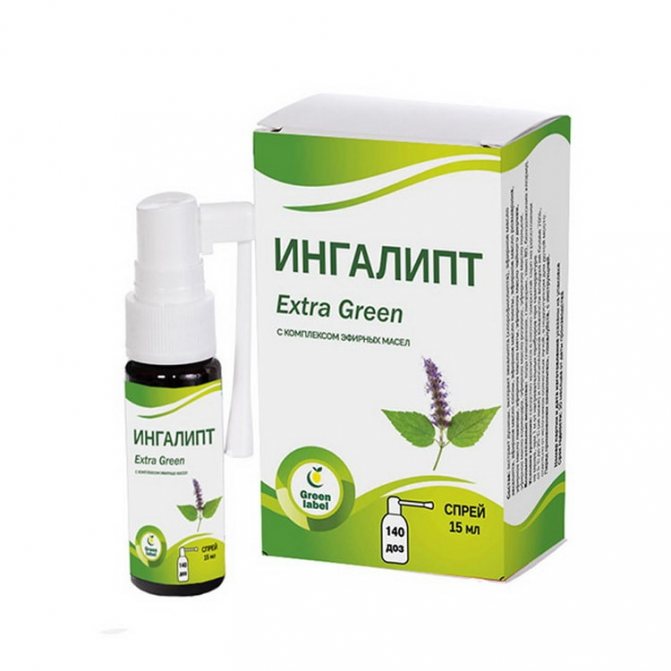
- Hexoral. This medicine is also available in spray form. The main advantage of this medicine is that it can be used for throat diseases while breastfeeding.
- Lysobacter. Produced in the form of lozenges. This remedy is effective, but in order to avoid negative effects on the baby, you need to strictly follow the dose.
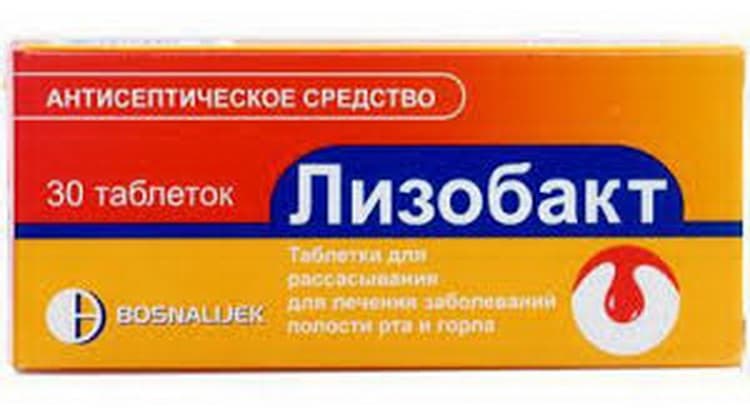
- Furacilin. It is produced in the form of tablets or solution. Used for gargling.
- Miramistin. This is a solution that is used for repeated rinsing.
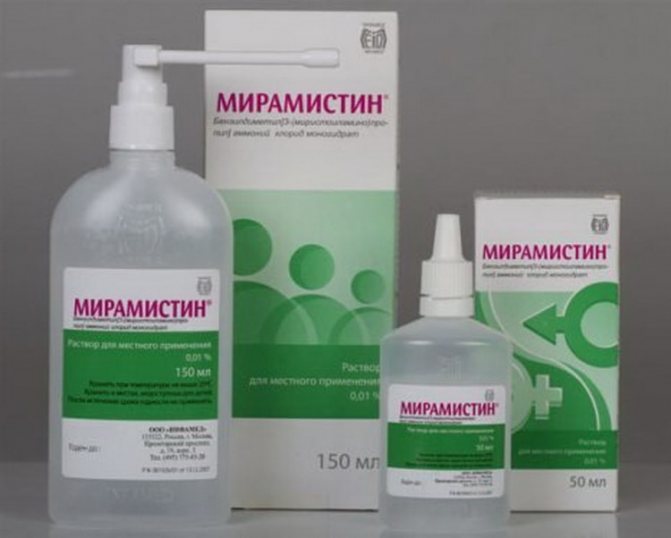
Drug treatment of throat during breastfeeding
There are many drugs on the market intended for the treatment of diseases, the main symptom of which is a sore throat. But many of them are contraindicated during lactation. Every young mother should know which products can be considered safe.
To prevent the further proliferation of pathogenic microorganisms, medications are used in different dosage forms:
- rinsing solutions;
- throat sprays;
- lozenges;
- lozenges
Depending on the active components, they can have an antiseptic or antibacterial effect (fight viruses or bacteria). In addition, such drugs have an analgesic effect, helping to relieve unpleasant symptoms and alleviate a woman’s condition.
Rinse solutions
The drug Furacilin is widely known, the advantage of which is that it is not prohibited during breastfeeding. It is used mainly for bacterial infections. The only contraindication is hypersensitivity to the active ingredient. To prepare the solution, use a tablet form of the medicine. First, 40 g of the product (2 tablets) are diluted in 200 ml of warm water. The oropharynx is treated with it at least 4 times a day.
On sale you can find a ready-made alcohol solution of Furacilin. However, the medicine should not be used in this form by a nursing mother. Alcohol can enter the systemic circulation, albeit in small quantities.

Therapeutic rinses will help relieve sore throat
During lactation, a 0.5% solution of Chlorhexidine, which is active against many bacteria, can be used to treat a young mother. It not only suppresses the proliferation of pathogenic microorganisms, but also relieves pain. There is no need to dilute the medicine. Initially, you need to rinse your throat with warm water, then with a teaspoon of the drug. It is recommended to carry out the procedure 3-4 times a day.
Miramistin is another popular topical antiseptic drug that is used when breastfeeding a baby. It helps fight infections caused by both viruses and bacteria. Its active component is practically not absorbed into the systemic bloodstream, which means it does not pass into breast milk. Additionally, there is no need to dilute the medicine with water. As in the case of Chlorhexidine, you must first rinse your throat with water, then use the drug. For one procedure, 15 ml of solution (a tablespoon) is enough, the frequency of use is up to 5 times a day.
The manufacturer produces Miramistin solution complete with a spray nozzle, thanks to which you can not just gargle, but irrigate the oropharynx with a spray.
Sprays for sore throat
Medicines in the form of sprays are popular due to their ease of use. During lactation, the drug Hexoral can be prescribed, which suppresses the activity of bacteria, but is also used for colds. It comes in the form of a solution and spray, which should be used after meals twice a day. For one rinse, 15 ml of undiluted liquid is enough. Spraying from a can lasts 1–2 seconds. Contraindications include hypersensitivity to the drug. Before prescribing it to a nursing mother, the therapist must weigh the potential benefits for the woman and harm to the child.
Combined spray and aerosol Kameton is prescribed for both viral and bacterial infections in the acute phase. Its components have an analgesic, anti-inflammatory and antiseptic (disinfecting) effect when applied topically. The drug is sprayed by inhalation 3-4 times a day.
Photo gallery: solutions and sprays for treating a sore throat
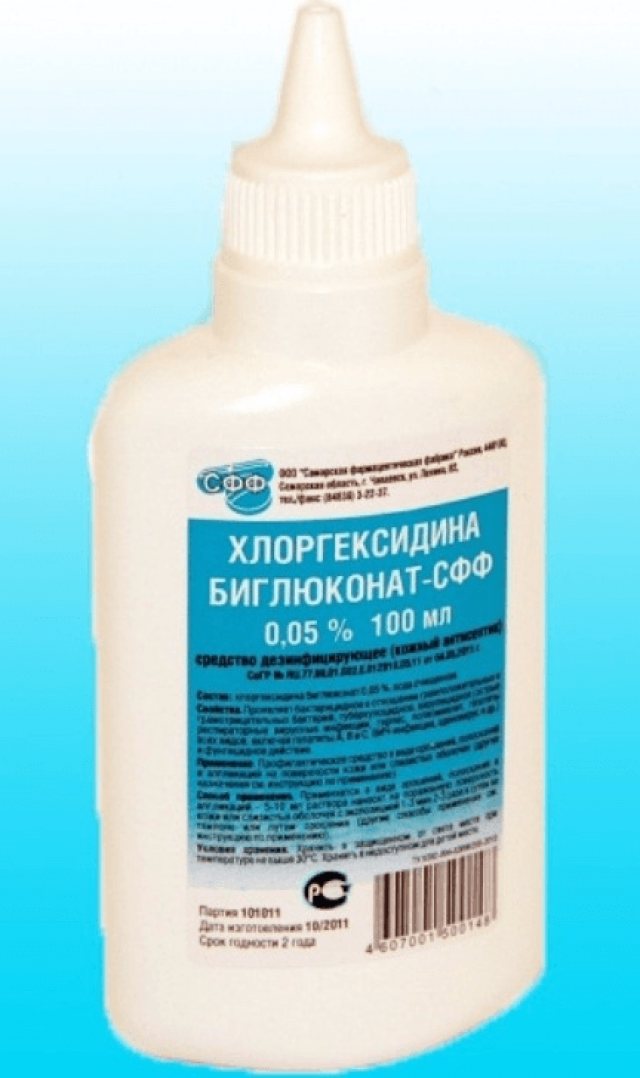
Chlorhexidine is a rinse solution with an antiseptic and analgesic effect.
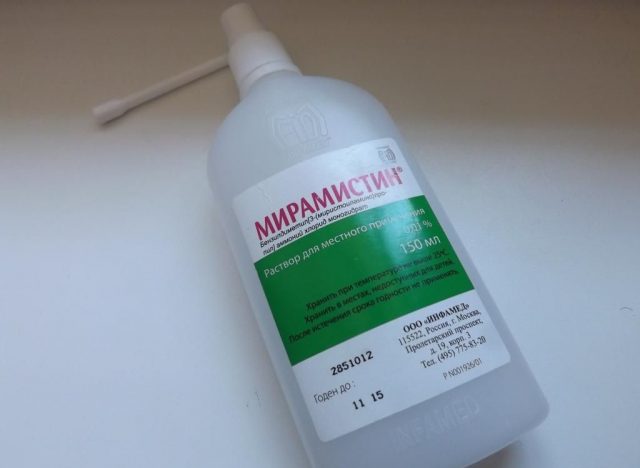
Miramistin gargling solution is not contraindicated during lactation
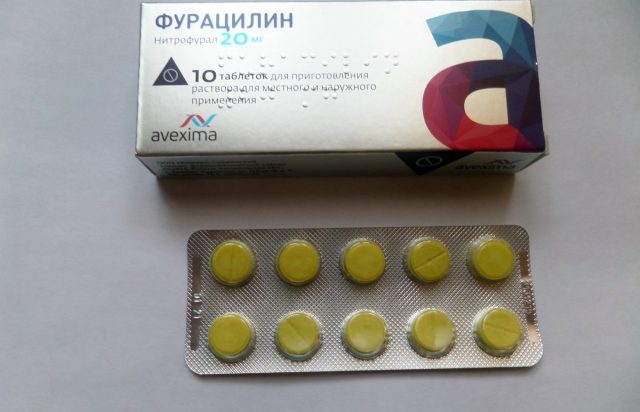
Furacilin is an effective and inexpensive medicine prescribed to nursing mothers as a gargle for sore throats.
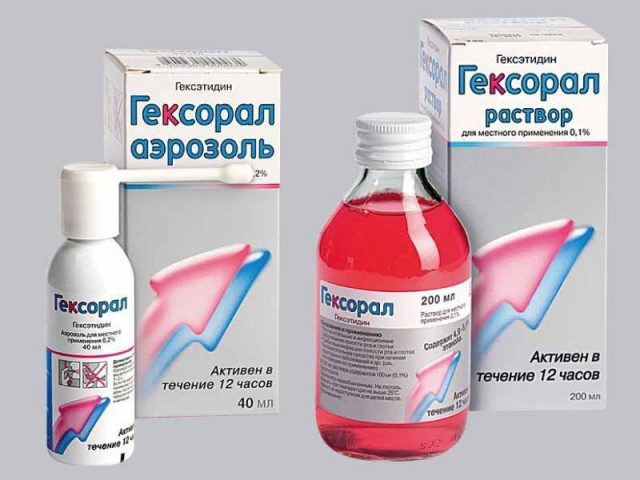
Hexoral is a French drug produced in the form of a spray and rinse solution.
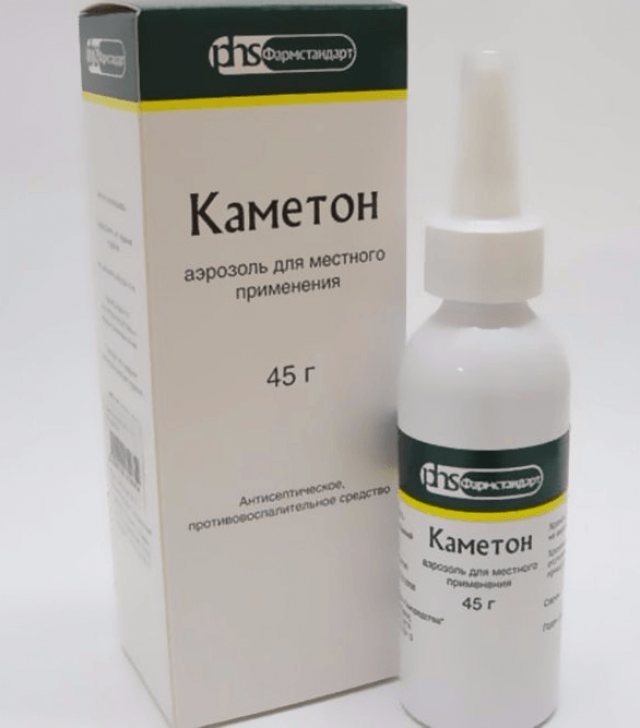
Aerosol Kameton is effective in the acute phase of the disease
Tablets and lozenges
You can relieve a sore throat with lozenges. The drug Lizobact is approved for use during lactation. It has a powerful antiseptic effect and prevents the proliferation of pathogenic agents (viruses and bacteria). It is recommended to dissolve the medicine slowly, do not bite. The dissolved mass should be retained in the oral cavity for as long as possible. The procedure is carried out 3–4 times a day.
Faringosept is another antiseptic that is widely used in ENT practice. It is prescribed for bacterial infections. The tablets should be dissolved after meals up to 5 times a day. The only contraindication is hypersensitivity to the components.
Drugs in the form of lozenges dissolve more slowly, so the active substance is better distributed throughout the oropharynx. During lactation, Lizak may be prescribed to treat the throat after assessing the potential benefit to the mother and harm to the baby. It has antiseptic and antibacterial activity, therefore it is used for viral and bacterial infections.
Septolete also shows good results. It has an antimicrobial, anti-inflammatory, analgesic effect. It is recommended to dissolve it until completely dissolved every 2–3 hours. A nursing woman can take up to 6 lozenges per day.
Photo gallery: tablets and lozenges for sore throat for nursing mothers
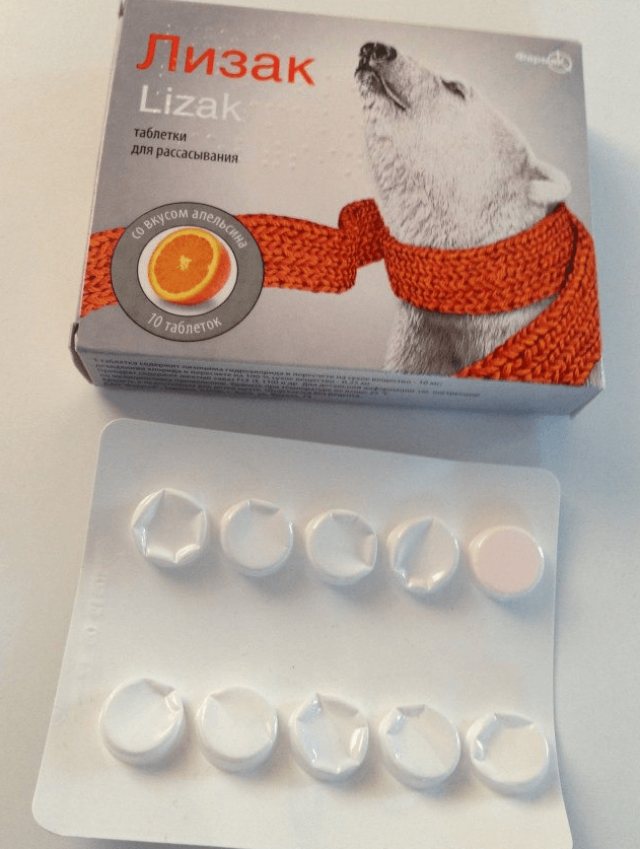
Lizak can only be used during breastfeeding as prescribed by a doctor.
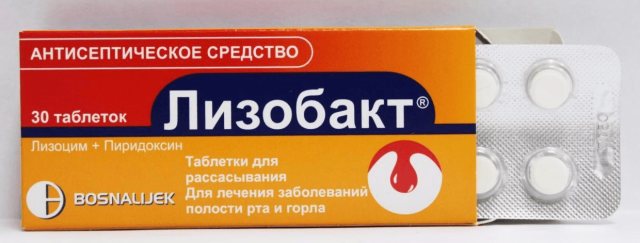
Lyzobact is a drug with a powerful antiseptic component lysozyme hydrochloride and vitamin B6
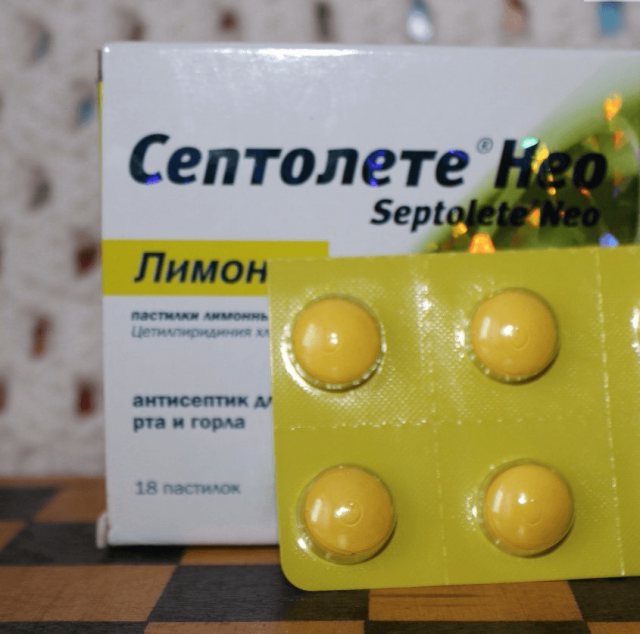
Septolete - lozenges from Slovenia containing essential oils of plants
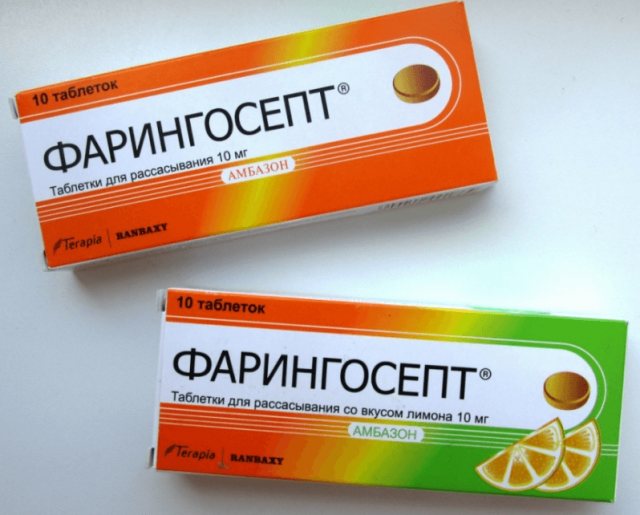
Faringosept is a safe medicine for sore throat with chocolate or orange flavor
Interesting topics
- Find out if it is safe to take paracetamol while breastfeeding.
- To raise a healthy baby, you need to follow the right diet while breastfeeding.
- The well-being of her child depends on the foods a mother eats. Read about the effects of coffee on your baby while breastfeeding.
- A nursing mother is deprived of many pleasures. During lactation, you cannot eat certain foods, you cannot drink soda and drink alcohol. Find out if you can drink non-alcoholic beer while breastfeeding.
[Girls, tell me, did your throat hurt while breastfeeding? Describe in your comments how you fought this disease and what medications you used./wpmfc_cab_ss]
